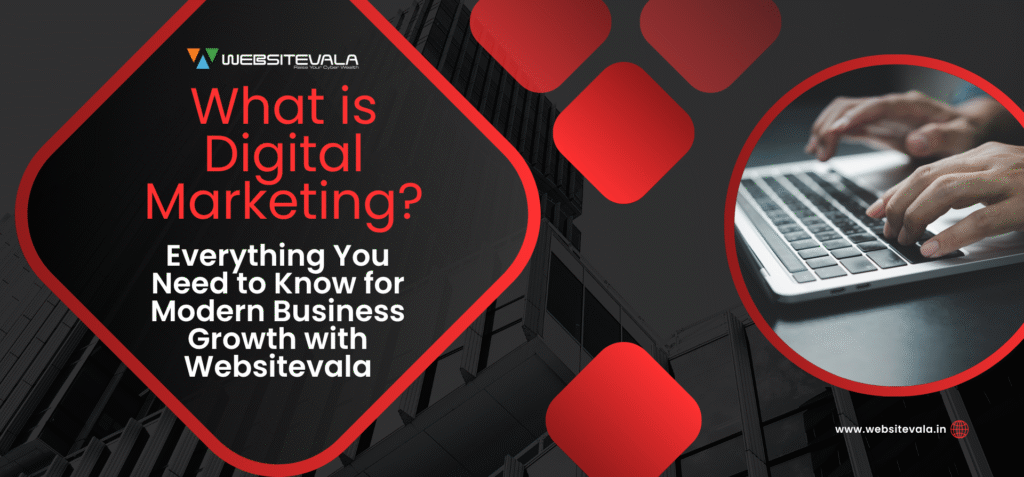Jump Directly to the Topic of Your Interest
Toggle- What is Digital Marketing?
- The Benefits of Digital Marketing
- Is Digital Marketing the Same as Online Marketing?
- Types of Digital Marketing
- 1. Search Engine Optimisation (SEO)
- 2. Search Engine Marketing (SEM)
- 3. Content Marketing
- 4. Social Media Marketing (SMM)
- 5. Email Marketing
- 6. Pay-Per-Click (PPC) Advertising
- 7. Affiliate Marketing
- 8. Influencer Marketing
- 9. Native Advertising
- 10. Mobile Marketing
- 11. Video Marketing
- 12. Interactive Content Marketing
- How to Do Digital Marketing
- Challenges in Digital Marketing, Including Privacy-First Marketing
- Digital Marketing Trends for the Future: The Rise of AI-Powered SEO
- Leveraging Technology for Your Digital Marketing Efforts with Websitevala
- Key Takeaways
In today’s interconnected world, a robust online presence isn’t just an advantage – it’s the foundation of modern business success.
The global digital advertising market is valued at approximately USD 650 billion in 2025 and is projected to reach around USD 1,483 billion by 2034, growing at a compound annual growth rate (CAGR) of 9.47% over the forecast period.
For businesses aiming to stand out, understanding and implementing effective digital marketing strategies is paramount. At Websitevala, we empower businesses in India, the UK, and across the globe to conquer this digital world, starting with compelling AI website creation and comprehensive digital marketing solutions.
What is Digital Marketing?

Digital marketing encompasses all marketing efforts that utilise an electronic device or the internet. It’s about strategically connecting with current and prospective customers through digital channels such as:
- Search engines
- Social media
- Other websites
Unlike traditional marketing, digital marketing offers superior targeting, real-time interaction, and highly measurable results. It enables businesses, from startups to established enterprises, to meet their audience precisely where they spend most of their time: online.
The Benefits of Digital Marketing
The undeniable shift towards digital marketing is driven by its powerful advantages:
Global Reach & Local Impact
Digital channels enable businesses to reach global audiences while local SEO allows for hyper-local targeting of specific communities.
Cost-Effectiveness & High ROI
Often more affordable than traditional advertising, digital marketing can deliver a higher return on investment due to its precision targeting and measurable outcomes.
Measurable Results & Optimisation
Advanced analytics tools like Google Analytics (Source: Google) provide granular data on campaign performance, enabling continuous optimisation and data-driven decisions.
Enhanced Personalisation
Digital platforms facilitate highly personalised marketing messages based on user data, leading to stronger engagement and conversion rates.
Direct Engagement & Community Building
Real-time interaction with customers through comments, shares, and messages fosters strong community loyalty and builds brand advocacy.
Streamlined Conversions
Digital marketing simplifies the customer journey, often providing direct calls to action that lead to convenient conversions.
Agility & Adaptability
Digital campaigns can be swiftly adjusted in response to performance data or sudden market shifts, ensuring your marketing efforts remain relevant and effective.
Is Digital Marketing the Same as Online Marketing?

While frequently used interchangeably, “digital marketing” is the broader umbrella term that includes “online marketing” (also known as “internet marketing”).
Online marketing specifically refers to efforts conducted over the internet, such as:
- SEO
- PPC
- Email campaigns
Digital marketing, however, extends to non-internet-based digital channels like:
- Mobile phone apps
- Digital billboards
- SMS marketing
Key Point: All online marketing is digital marketing, but not all digital marketing requires an internet connection.
Types of Digital Marketing
The digital marketing landscape is rich and diverse, offering a range of strategies to achieve varied business objectives:
1. Search Engine Optimisation (SEO)
The fundamental process of optimising your website to rank higher in search engine results, increasing organic (unpaid) traffic. This involves:
- On-page SEO (content, keywords)
- Off-page SEO (backlinks)
- Technical SEO (site speed, mobile-friendliness)
2. Search Engine Marketing (SEM)
A broader discipline that encompasses SEO alongside paid strategies like Pay-Per-Click (PPC) advertising to boost visibility on search engines.
3. Content Marketing
Creating and distributing valuable, relevant, and consistent content (blogs, videos, infographics) to attract and retain a defined audience, ultimately driving profitable customer action.
4. Social Media Marketing (SMM)
Leveraging social media platforms like Facebook, Instagram, LinkedIn, and X (formerly Twitter) to connect with audiences, build brand awareness, and drive sales.
5. Email Marketing
Sending targeted emails to a list of subscribers to promote products, share news, and cultivate lasting customer relationships.
6. Pay-Per-Click (PPC) Advertising
An advertising model where advertisers pay a fee each time their ad is clicked. Google Ads (Source: Google) is a prime example.
7. Affiliate Marketing
A performance-based strategy rewards affiliates for bringing new customers or visitors through their marketing efforts.
8. Influencer Marketing
Collaborating with individuals who have established credibility and a dedicated following in a specific niche to promote products or services.
9. Native Advertising
Advertisements that seamlessly blend with the surrounding content, appearing as natural editorial content rather than traditional ads.
10. Mobile Marketing
Mobile SEO strategies specifically designed for mobile devices, including:
- SMS marketing
- In-app advertising
- Mobile-optimised websites
11. Video Marketing
Utilising videos on platforms like YouTube and TikTok to promote brands, products, or services.
12. Interactive Content Marketing
Engaging audiences with quizzes, polls, calculators, and interactive infographics to provide value and gather user data.
How to Do Digital Marketing
Implementing a successful digital marketing strategy requires a methodical approach:
Step 1: Define Your Goals
Clearly outline what you aim to achieve, whether it’s:
- Increasing website traffic
- Generating leads
- Boosting sales
Step 2: Identify Your Target Audience
Develop a deep understanding of your ideal customers:
- Demographics
- Interests
- Pain points
- Online behaviour
Step 3: Set Your Budget
Allocate resources effectively across different digital marketing activities.
Step 4: Select Your Channels
Choose the most appropriate digital marketing types that align with your goals and resonate with your target audience.
Step 5: Create High-Quality, People-First Content
Develop compelling, relevant content that genuinely solves problems or provides value for your audience. Focus on demonstrating Experience, Expertise, Authoritativeness, and Trustworthiness (E-E-A-T).
Step 6: Optimise for Mobile & User Experience
Ensure all your digital assets, including your website (especially those built with AI website creation tools), emails, and ads, are fully responsive and provide an exceptional user experience on all devices.
Step 7: Measure, Analyse, and Refine
Continuously monitor campaign performance using analytics tools. Use insights to iterate and improve your strategies.
Step 8: Integrate Your Efforts
Create cohesive, multi-channel campaigns that provide a unified brand message and a seamless customer journey.
Challenges in Digital Marketing, Including Privacy-First Marketing

The digital realm, while offering immense opportunities, also presents distinct challenges:
Dynamic Algorithms
Search engine and social media algorithms are constantly evolving, demanding continuous adaptation from marketers.
Intense Competition
The online space is crowded, making it crucial to develop unique strategies to stand out.
Measuring Holistic ROI
Accurately attributing and measuring the return on investment across complex digital marketing efforts can be challenging.
Building & Maintaining Trust
In an era of abundant information and ad fatigue, fostering customer trust is more critical than ever.
Data Privacy and Compliance (Privacy-First Marketing)
Navigating increasingly stringent regulations like GDPR and the upcoming phase-out of third-party cookies necessitates a privacy-first marketing approach. This means prioritising the collection and ethical use of first-party data to build trust and deliver personalised experiences without compromising user privacy.
Digital Marketing Trends for the Future: The Rise of AI-Powered SEO
The digital marketing landscape is in constant flux, driven by technological advancements and evolving consumer behaviours. Here are pivotal trends shaping its future:
Artificial Intelligence (AI) and Automation
AI continues to revolutionise personalisation, content creation, data analysis, and ad optimisation. Expect to see even more sophisticated AI-powered SEO tools that help refine keyword strategies, identify content gaps, and predict shifts in rankings.
Voice and Visual Search Optimisation
As voice assistants and image recognition technologies become more prevalent, optimising content for conversational queries and visual searches will be crucial.
Interactive Content
Engaging formats like AR/VR experiences, shoppable videos, and dynamic quizzes will become standard for immersive brand interactions.
Hyper-Personalisation at Scale
Leveraging advanced data analytics and AI to deliver incredibly precise, individualised marketing messages and experiences.
Sustainability in Marketing
Consumers are increasingly valuing eco-conscious brands, leading to a focus on sustainable and ethical marketing practices.
A “Cookie-less” Future and First-Party Data
The industry’s move away from third-party cookies makes first-party data collection and utilisation paramount for targeted advertising and personalised customer journeys. Businesses will focus on building direct relationships with their customers to gather valuable, consented data.
Leveraging Technology for Your Digital Marketing Efforts with Websitevala

To effectively navigate the complexities and capitalise on the vast opportunities of digital marketing, businesses require robust technological foundations and expert guidance. This is where Websitevala steps in.
As a leading provider of AI website creation and comprehensive digital marketing services, including cutting-edge AI-powered SEO strategies, Websitevala offers tailor-made solutions. From developing engaging, high-performance websites that serve as your digital hub to implementing privacy-first marketing campaigns that resonate with your audience, we ensure your online presence is not just visible but truly impactful.
Our team specialises in:
- Crafting SEO-rich content
- Implementing effective social media strategies
- Driving measurable results that accelerate your business growth in the competitive digital world
Ready to Transform Your Digital Presence?
Ready to transform your digital presence and unlock your business’s full potential? Contact Websitevala today for a consultation on:
- AI website creation
- AI-powered SEO
- Holistic digital marketing solutions designed for your success
Key Takeaways
Digital marketing is not just a trend—it’s the future of business growth. With the right strategy, tools, and expertise, your business can thrive in the digital landscape. Whether you’re looking to improve your SEO, create engaging content, or build a comprehensive digital marketing strategy, Websitevala is here to help you succeed.
Ready to dominate the digital world? Contact Websitevala today and let’s build your success story together.


As a digital marketer, SEO lecturer and WordPress developer I support other freelancers and businesses with their websites from helping with the design and blog posts to optimizing them for search engines. I’m the founder of Websitevala and support successful digital marketing companies like ClickDo as a virtual assistant.



